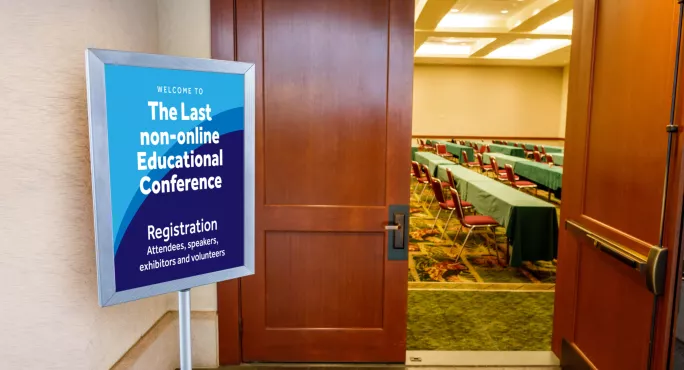Do we need in-person education conferences after Covid?

Between 2006 and the early part of 2020, it’s safe to say I went to more Scottish education conferences than anyone else in the country - and second place probably wasn’t particularly close.
Hundreds and hundreds of them, sometimes several in one week, covering all sorts of issues directly and more tangentially affecting education. They could vary wildly in intent, scale and feel, from dull government-endorsed policy events to others that explicitly vaunted “dangerous ideas”.
And then in March 2020, they all suddenly stopped.
Even as we inch tentatively towards the post-Covid era, education conferences show little sign of coming back in their pre-pandemic form. The biggest of the lot, the Scottish Learning Festival, has, at least temporarily, been transformed into an online event, and - with organisers safe in the knowledge that there is now a population au fait with Zoom and Microsoft Teams - that now appears to be the standard approach for the relatively few education conferences being organised in 2022.
Should we regret the loss of those in-person and (usually) day-long events? Obviously, the often valuable networking and catch-ups over coffee cannot, in any way, be replicated digitally but, setting that aside, have we really lost anything much if conferences make a wholesale move to the online world?
Having not been to an in-person conference for more than two years - and while acknowledging that some could be very useful and informative - here’s what I remember about the conferences of old, when they were at their worst:
1. There weren’t enough teachers
It was surprising how underrepresented practising teachers often were at what were ostensibly conferences focusing on key issues around their work.
2. They went on too long
Conferences were often flabby and unfocused. I tuned in to an hour-long event recently that, largely as a result of its brevity, was tightly focused and fizzing with ideas. I was left with most of the rest of the day to do other things, and marvelled at how much ground had been covered in an event that, pre-Covid, would probably have been strung out over a day.
- Opinion: Education is like the cinema, not Netflix: communal
- A teacher’s view: ‘A true learning festival needs critical voices’
- Long read: Is this the way to get teachers into rural schools?
3. Sessions overran
Organisation was often an issue, with sessions running late or questions at the end treated as an optional extra (even though a concluding Q&A is often the most useful part of a session, because the speaker has to think on their feet about issues that are actually affecting people in the audience). Overrunning seemed particularly inconsiderate to people who had travelled long distances to be there and had tight train connections to make, who now had to hurriedly get their things together and make a sheepish apology as they bustled out of the room with the conference still going.
4. Keynote speakers took a cookie-cutter approach
There were plenty of bland, written-by-committee keynotes (you could usually safely assume that a government minister would have little new insight to offer). And some of the speakers brought in to provide inspiration had little to say once you scratched beneath their polished delivery. Some keynote speakers seemed to be regurgitating the same presentations they’d done countless times before. One very high-profile educator, who gave a 20-minute headline speech, seemed entirely ignorant that Scotland had a separate education system to England.
5. Breakouts and workshops could seem pointless
When parameters were unclear and aims too vague, breakouts often seemed like they were happening simply because they had become a standard part of a conference rather than because they proved useful.
6. There was a dispiriting sense of box-ticking
Conferences often circled back to vague policy ambitions but left delegates little wiser about how they could (and sometimes why they should) be achieved. Already abstract concepts were clouded by jargon, as the same messages were trotted out time and again. The realities in schools and classrooms often felt remote - perhaps as a result of point 1.
7. Food was bad
This is not a flippant point. If people have invested time and money to be at your event, the least you can do is feed them well. I’ll never forget the conference on children and healthy eating, whose key messages were rather undermined when, during the morning coffee break, we were served up giant doughnuts that groaned under the weight of their fluorescent icing.
8. Even the best conferences could leave nagging doubts
I should say again that I have seen some fantastic and inspiring stuff at conferences, and events where delegates left with a spring in their step. But what happened next? How much contact was maintained with delegates? How can we be sure that, after that initial buzz, there was any lasting impact?
Online conferences have, at least for now, become the norm. In my limited experience so far, the quality varies as much as it did before Covid (and questions at the end are still too easily sacrificed). But even the worst won’t leave you with a long journey home where you keep asking, “Why did I bother with that?”
Henry Hepburn is Scotland editor for Tes. He tweets @Henry_Hepburn
You need a Tes subscription to read this article
Subscribe now to read this article and get other subscriber-only content:
- Unlimited access to all Tes magazine content
- Exclusive subscriber-only stories
- Award-winning email newsletters
Already a subscriber? Log in
You need a subscription to read this article
Subscribe now to read this article and get other subscriber-only content, including:
- Unlimited access to all Tes magazine content
- Exclusive subscriber-only stories
- Award-winning email newsletters
topics in this article



